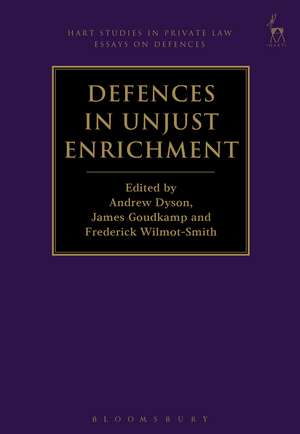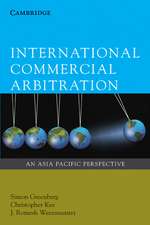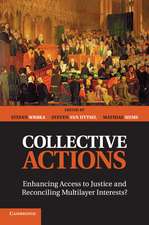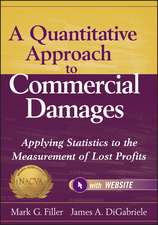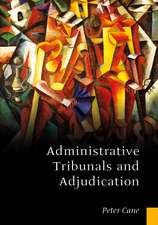Defences in Unjust Enrichment: Hart Studies in Private Law: Essays on Defences
Editat de Dr Andrew Dyson, Dr James Goudkamp, Frederick Wilmot-Smithen Limba Engleză Hardback – 13 ian 2016
| Toate formatele și edițiile | Preț | Express |
|---|---|---|
| Paperback (1) | 357.17 lei 6-8 săpt. | |
| Bloomsbury Publishing – 25 apr 2018 | 357.17 lei 6-8 săpt. | |
| Hardback (1) | 719.02 lei 6-8 săpt. | |
| Bloomsbury Publishing – 13 ian 2016 | 719.02 lei 6-8 săpt. |
Preț: 719.02 lei
Preț vechi: 1030.31 lei
-30% Nou
Puncte Express: 1079
Preț estimativ în valută:
137.60€ • 149.41$ • 115.58£
137.60€ • 149.41$ • 115.58£
Carte tipărită la comandă
Livrare economică 22 aprilie-06 mai
Preluare comenzi: 021 569.72.76
Specificații
ISBN-13: 9781849467254
ISBN-10: 1849467250
Pagini: 360
Dimensiuni: 169 x 244 x 15 mm
Greutate: 0.73 kg
Editura: Bloomsbury Publishing
Colecția Hart Publishing
Seria Hart Studies in Private Law: Essays on Defences
Locul publicării:London, United Kingdom
ISBN-10: 1849467250
Pagini: 360
Dimensiuni: 169 x 244 x 15 mm
Greutate: 0.73 kg
Editura: Bloomsbury Publishing
Colecția Hart Publishing
Seria Hart Studies in Private Law: Essays on Defences
Locul publicării:London, United Kingdom
Caracteristici
The essays explore the links between unjust enrichment defences on a theoretical level, and examine the nature and scope of individual defences.
Notă biografică
Andrew Dyson is an Assistant Professor in Private Law at the London School of Economics and Political Science.James Goudkamp is a Fellow of Keble College and an Associate Professor in the Oxford Law Faculty. He is also a barrister at 7 King's Bench Walk. Frederick Wilmot-Smith is a Prize Fellow at All Souls College, Oxford.
Cuprins
1. Defences in Unjust Enrichment: Questions and Themes ANDREW DYSON, JAMES GOUDKAMP AND FREDERICK WILMOT-SMITH2. Defences and the Disunity of Unjust Enrichment LIONEL SMITH3. Defence, Denial or Cause of Action? 'Enrichment Owed' and the Absence of a Legal Ground HELEN SCOTT4. What Kind of Defence is Change of Position? DENNIS KLIMCHUK5. The Unity of Pre-receipt and Post-receipt Detriment AJAY RATAN6. Proprietary Restitution and Change of Position ROBERT CHAMBERS7. Change of Position: Outstanding Issues ELISE BANT8. The Defence of Illegality in Unjust Enrichment GRAHAM VIRGO9. Minority and Unjust Enrichment Defences BIRKE HÄCKER10. Defences to Restitution Between Victims of a Common Fraud ANDREW KULL11. Bona Fide Purchase as a Defence in Unjust Enrichment SONJA MEIER12. Counterfactual Arguments Against Woolwich Liability CHARLES MITCHELL13. Theory and Practice ROBERT REED
Recenzii
This is a welcome addition to unjust enrichment scholarship, as the study of defenses (and the change of position defence in particular) has been central to the development of this area of law in recent years. [The book] offer[s] a timely and rigorous analysis of some of the core problems currently debated by unjust enrichment scholar[s].[T]he various contributions in this volume provide the reader with state-of-the-art academic analysis of the law of unjust enrichment, together with the most relevant critique of this type of intellectual project. Together, they make for a thought-provoking collection for any reader interested in the fundamental problems of private law theory.
the editors and contributors are to be congratulated on a book which will stimulate further necessary debate about defences to unjust enrichment claims. It should be widely read and engaged with. I look forward to the next instalments in the editors' series, on defences in contract and equity.
this book . contains a host of insights, suggestions and arguments that are sure to spawn the kind of new writing on unjust enrichment that is so essential if this area of law is to flourish on sound foundations.
Defences in Unjust Enrichment should enjoy a warm welcome from Canadian lawyers. Aside from the fact that three of the papers were written by Canadians, the work holds important lessons for the development of Canadian unjust enrichment under Garland.
the editors and contributors are to be congratulated on a book which will stimulate further necessary debate about defences to unjust enrichment claims. It should be widely read and engaged with. I look forward to the next instalments in the editors' series, on defences in contract and equity.
this book . contains a host of insights, suggestions and arguments that are sure to spawn the kind of new writing on unjust enrichment that is so essential if this area of law is to flourish on sound foundations.
Defences in Unjust Enrichment should enjoy a warm welcome from Canadian lawyers. Aside from the fact that three of the papers were written by Canadians, the work holds important lessons for the development of Canadian unjust enrichment under Garland.
